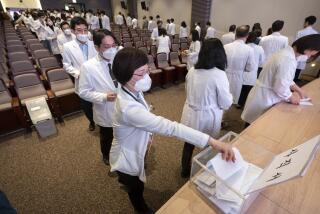Plagiarism dispute has high stakes
A prominent South Korean fertility researcher with growing healthcare enterprises in Los Angeles has launched a vigorous legal and public relations campaign in advance of a meeting today to decide whether he and others plagiarized a research paper.
The moves by Dr. Kwang-Yul Cha are unusual and have surprised medical journal editors nationally, who worry about the ability of academic publications to cope with such challenges.
Cha has threatened a defamation suit against the editor of the journal Fertility and Sterility, which published the paper in question, over the editor’s remarks in the media that suggested the article had been plagiarized. He also has dispatched a public relations firm to present his side of the issue in newspapers and magazines.
The publications committee for the American Society of Reproductive Medicine, which oversees the journal, is scheduled to meet in Santa Fe, N.M., today to rule on what should be done about the research controversy.
The dispute, which gained more attention last week with publication of a detailed recounting in the British Medical Journal, pits Cha against a former laboratory researcher, Jeong-Hwan Kim. Kim alleges that Cha and others translated and reprinted his doctoral thesis about premature ovarian failure under their names.
Cha has a lot at stake. The CHA Regenerative Medicine Institute he founded is poised to receive roughly $2.6 million from the newly created California Institute for Regenerative Medicine, the state’s high-profile stem cell research initiative.
Although not a medical doctor in the United States, Cha is a powerful and celebrated figure in South Korea who some hope will revive that country’s efforts to take the lead in stem cell research. Those efforts suffered a terrible blow in 2006 when famed researcher Woo-Suk Hwang was found to have faked data in a human cloning experiment.
But medical publications have something important at stake as well: their academic independence and the money it might take to defend it, journal editors said.
“In order to be able to do what Dr. Cha has done, you have to have a ton of money, and the vast majority of scientists do not,” said Dr. Drummond Rennie, deputy editor of the Journal of the American Medical Assn. “He’s created a situation where things are very much stacked against the journal.”
Dr. Alan DeCherney, editor of Fertility and Sterility, which is essentially a three-person operation based in Birmingham, Ala., said he and the committee would not be swayed by the lawsuit threats.
“This behavior is unprecedented,” DeCherney said. “Attorneys never get involved in cases like this. They just get worked out between the parties.”
In February, The Times reported on Kim’s allegations that his research paper had been copied by Cha and others. The study first was published under Kim’s name in a South Korean journal in January 2004. A similar version appeared in English in Fertility and Sterility in December 2005, listing Cha as the primary author.
Through a spokesman, Cha declined to comment for this article. But he has written to The Times that he was entitled to be named “first author” because he originated the project idea and provided guidance and oversight for patient sample collection. In addition, the work was done in his research facilities.
Cha said Kim had been listed as an author of the Fertility and Sterility piece but was dropped because he couldn’t be found to sign necessary papers. Cha also said he had been unaware the material had been published in the South Korean journal.
DeCherney, who has said he believes plagiarism occurred, told The Times and other publications in February that he would be acting quickly to discipline Cha and the other authors on the paper.
Cha responded March 7 with a letter from Beverly Hills attorney Anthony Michael Glassman to DeCherney, demanding that DeCherney sign a statement essentially retracting what he’d said to The Times and to the online magazine the Scientist. Glassman also sent a letter threatening to sue The Times for defamation.
“Dr. Cha stands ready to protect his rights by immediately filing a suit for defamation against you and F&S;,” Glassman wrote to DeCherney in the letter.
In an interview this week, DeCherney said he intended to recommend to the society’s publications committee that Cha and the other doctors on the study be banned from publishing in Fertility and Sterility for up to three years. He noted, however, that the underlying science of the study is solid.
The Korean Society of Obstetrics and Gynecology has asked Fertility and Sterility to retract the article entirely. Some members of Fertility and Sterility’s editorial board agree.
In a telephone interview, Kim said he has tried to keep a low profile since moving to Singapore, although he said he had received multiple calls and letters from associates of Cha who have chastised him or pressured him to back down.
“It’s very intimidating,” Kim said. “Cha might not be as well known in the United States, but he has an amazing amount of power in Korea. I am worried that I could have trouble even here in Singapore.”
Cha has declined to give interviews. But to help tell his side of the story, he has enlisted the PR firm that he has used to address other controversies surrounding his businesses, Sitrick and Co.
He also has recently distanced himself somewhat from some of his L.A.-based healthcare businesses. When The Times first published its story, Cha was listed with the California Secretary of State as the president of CHA Health Systems, the CHA Fertility Center and the CHA Regenerative Medicine Institute. But within a few weeks, his name had been removed as president from corporate documents related to those entities.
Times staff writer Charles Ornstein contributed to this report.






